Summer Study: What Do Phase I Scholars Do?
DO‑IT Phase I Scholars participate in a two-week, live-in Summer Study session on the UW Seattle campus. They learn about college life; explore the Internet; interact with peers, staff, and mentors; and have fun. The DO‑IT Scholars program started in 1993 as an experimental project for teens with disabilities nationwide. It is currently open to Washington State teens and is supported by the State of Washington, the Boeing Company, the Microsoft Corporation, and the National Oceanic and Atmospheric Administration.
First Day Jitters
As we drive onto the amazingly beautiful University of Washington campus, the butterflies start coming. We think, what will the first day be like? What will the people be like? Will we get along with our dorm mates? Will the food be good? Will we be scared to ask new people about their disabilities?
In the dorm, the people at the front desk were super nice and helpful, taking us to our rooms and telling us how to unlock the door, how to use the food key, where to click your key to get into the hallway. After that, we grabbed our schedules and our bags and walked down the hill to Haggett Hall, where some of the parents were with DO-IT staff. We had introductions and a speech called “This is your life,” and then we went outside for dinner.
After dinner, the Interns held a panel where they told stories about their lives and how DO-IT helped them. They were in our shoes only a couple of years ago; it was inspiring to know we weren’t the only people who struggle. After the panel, we headed back up to our dorm for some evening activities and to unpack. Some of us went outside to play some sports, while others stayed inside to talk or play ping-pong. We had some amazing laughs and met some amazing people!
Card Games and People with Disabilities
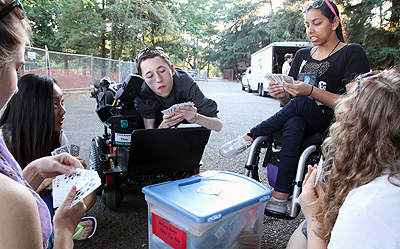
Playing card games can be entertaining for everybody. However, sometimes people with disabilities need to adapt the game to make it fully accessible.
We did some research by asking Scholars how they make themselves comfortable while playing cards. First, we talked to Alex. He has mild autism, which makes him hypersensitive to light and miss some social cues. Alex adapts by researching, so he’s prepared to play. The next Scholar we talked to is Thor, who has desmin myopathy. He needs a special type of wheelchair. He can play as long as the table is low enough for him to put his cards down. The last Scholar we talked to is Jason, who has low vision. In order for him to read or see his cards, he has to look at them up close.
Our research shows that adaptions can be made so that everyone feels comfortable playing cards.
Accessibility of the Seattle Aquarium
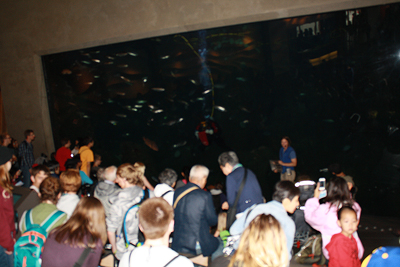
The Seattle Aquarium does not have too many accessibility issues for most disability types. Wheelchairs have access to most areas, but some exhibits have staircases, and big crowds make it hard to get around. This could also be a problem for visitors who need to stay close to an interpreter or staff member.
For people who are blind, someone would need to describe each of the animals in tanks or habitats. People who are deaf or hard of hearing may want an interpreter to understand what some of the staff are saying. People with dwarfism will have a hard time seeing some of the displays. Those with learning disabilities can also have a few problems. If heavy crowds are not an issue, most places in the aquarium are accessible.
What Do You Want to Eat?
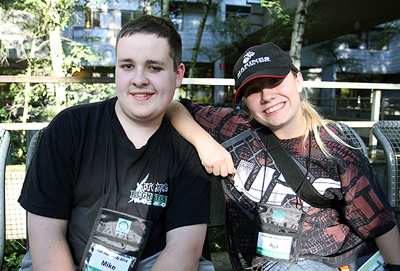
For most college students and DO-IT Scholars, the cafeteria is the place to be—for food and meal times, as well as socialization. It is an escape from the classroom, something everyone is grateful for now and then.
Life at college is full of new experiences, and the food is no exception. During Summer Study, DO-IT Scholars took their meals with everyone else—in the food court for lunch and at the cafeteria for breakfast and dinner.
The dining hall in McMahon offers a variety of choices. For every meal, there are options besides the main dish. Breakfast starts bright and early at 7 a.m. with scrambled eggs, fruit, pancakes, oatmeal, and other breakfast staples.
DO-IT Scholars ate lunch in the Husky Union Building (HUB) Food Court, which has several “restaurants” to choose from. We ate at DUB Street Burgers, which serves hot dogs, chicken strips, chili-cheese fries, and onion rings. DUB Street also serves breakfast sandwiches and burritos every weekday. We also enjoyed Firecracker, a Chinese restaurant, which offers crispy orange chicken, broccoli beef, and popular sides like eggrolls and veggie chow mein.
We didn’t get a chance to eat at Pastaria, which has made-to-order pastas, or Paggliacci, which makes pizza with local ingredients. But as you can see, the campus has a lot to offer. Whether it’s made by the chefs at McMahon or in the restaurants offered by the HUB, there’s always something good to eat.
Coming Together
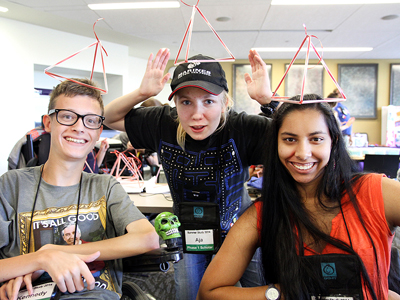
DO-IT is a place where kids with different types of disabilities come together for almost two weeks and learn about college life. All of us have often felt that we are different, but that’s not necessarily a bad thing. Upon first meeting, we made friends right away because we all had things in common.
Throughout Summer Study, it was fun and interesting to see how everyone coped with their differences. Our fellow Scholars were able to provide us with new ideas that could help us with our own disabilities, and we acquired a broader perspective on all of the different kinds of assistive technologies that are available.
We all came together and bonded without being reminded that we’re different, because at DO-IT, we all fit in.
Living in a College Dorm
We’ve learned a few things you should expect about dorm life, including living with a roommate, quiet hours, and using co-ed or shared bathrooms. All of these things can take some adjustment time.
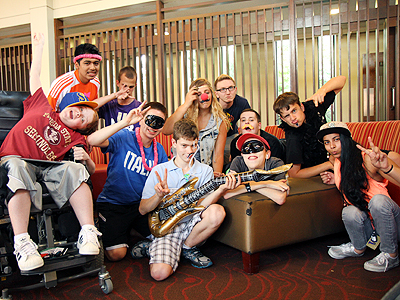
In a dorm, you will likely be assigned a roommate. It is important to be open-minded and have good communication skills. Even if you and your roommate are exact opposites, it can still be an enjoyable experience. The important thing to remember is that you’re not the only one that is going through this transition. Set up a plan with your roommate; for example, decide on separate spaces for each other’s things. That way each of you has an area to call your own.
In a college dorm there are designated quiet hours. It is important to respect these because people may be sleeping or studying, and hopefully people will extend the same courtesy to you when you need quiet time.
Many college dorms have shared bathrooms. They are sometimes co-ed, meaning males and females share the same bathrooms. These bathrooms can feel awkward at first. You don’t always know where to go, where to look, and where to do your business. One tip is to bring your clothes with you and change in the shower area. Another tip is to double check that there isn’t anyone in the stall you want to use (because nobody wants to experience that awkward moment). Just remember to respect people’s space, because not all of us feel comfortable with the same things.
Without Parent Supervision
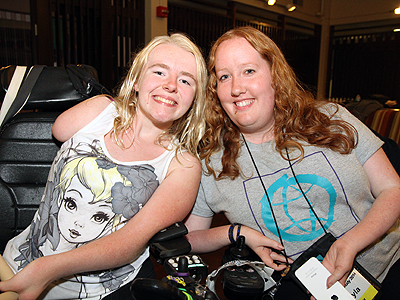
You learn a lot when you’re away from your parents. Summer Study taught us how to take responsibility, and helped us figure out what college life is like.
There is some adult supervision at Summer Study, for safety and to help us find things around the university. But for the most part, we took care of ourselves. We learned to keep important objects on us at all times, like our room keys. We also learned how to live with a roommate, and how important it is to communicate with the other person.
Without our parents to tell us to go to bed, we had to figure out how to get enough sleep to feel rested and get stuff done on time. We learned to be more independent.
Exploring Microsoft
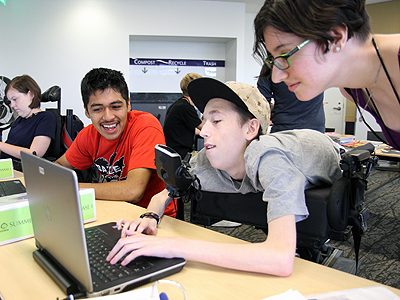
All of our field trips were cool, but this one really stood out. Microsoft’s presentation focused on audio, motion, and video technology, and they had a panel featuring employees with disabilities. With the Xbox Kinect and the Microsoft Phone, we had a glimpse into a future of interactivity that could change the world. With the disability panel, we got the idea that you can do anything you want regardless of what struggles you may face.
The Xbox Kinect is an add-on with the Xbox One, which tracks your motion and voice within a room. It can detect your hand, arm, and leg movements with surprisingly good accuracy. Using this technology, professional trainers can prescribe exercises using apps. The apps can tell you when you’re doing something right or wrong and measure accuracy. The results of your exercises can be sent to your trainer.
The camera shows a large amount of detail and has many different modes. One mode allows the image to be unaffected by light. There is also infrared mode, which shows body heat. The camera is commonly set up for game live streams, so the audience can see the players’ expressions.
Another interesting piece of technology is the Microsoft phone. A highlight is its voice commands. If you want it to tell you a joke, it will respond. If you ask it how the weather is in Seattle and then say “What about Hawaii?” it will recognize that you are still asking about the weather. Of course, it can still do the same things everyday phones can. If you don’t want to use voice commands, you can still do all the actions with your hands.
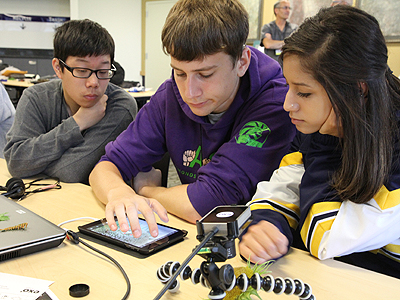
The panel included Microsoft employees with disabilities. One of the people on the panel was a quadriplegic, two of them had severely impaired vision, and one was deaf. They shared challenges they had to overcome, and that even though they have disabilities, they still lived their lives to the fullest and are successful employees at Microsoft.
We liked how we were able to learn about different things at Microsoft and that we could learn about it with people who know what it is like to have a disability. They helped us understand how we can do anything someone without a disability can do.
Going to Microsoft helped all of us learn that we can get jobs after college and get internships while in college. It built our confidence in what we can do after high school.
Favorite Hobbies of Scholars
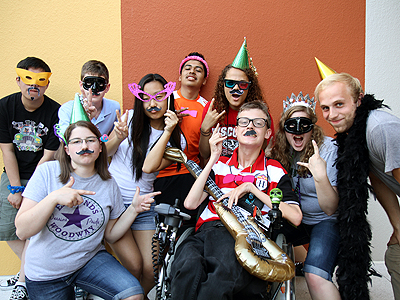
In a brief interview with our fellow Phase I Scholars, we asked what their favorite hobbies were. The responses included drawing, watching movies, swimming, hanging out with friends, hunting, watching TV, going to sporting events, and even cheerleading. However, the three most popular hobbies within our group were listening to music, reading books, and playing video games.
People have been listening to and composing songs since the invention of instruments, and music in all forms has been popular throughout history. Many of the Scholars enjoy listening to music of varying genres throughout the day and often can’t stop listening to especially catchy tunes. Some of the most popular genres liked by our Scholars include dance, pop, and rap.
Another popular hobby is playing video games. Video games are found almost anywhere nowadays such as in your smartphone, calculators, or even vending machines; they are not just limited to computers or consoles. Many students develop brand new games every single day with novel and interesting concepts that appeal to a small number of gamers, but sometimes they can explode in popularity if they are especially fun. Scholars, like many other teenagers, enjoy playing video games of different genres, including Flappy Bird, Mario Kart, and Halo.
Reading books is another classic pastime for both the young and old. There are brand new novels written every year. Sometimes an author’s very first book can be a hit, like Divergent by Veronica Roth, which was adapted into a movie released earlier this year.
In the end, whether it is turning pages to find out more about an exciting adventure, pressing buttons to blast another evil zombie, or bobbing to the beat of a wicked tune, there are many activities that our Scholars find very enjoyable.